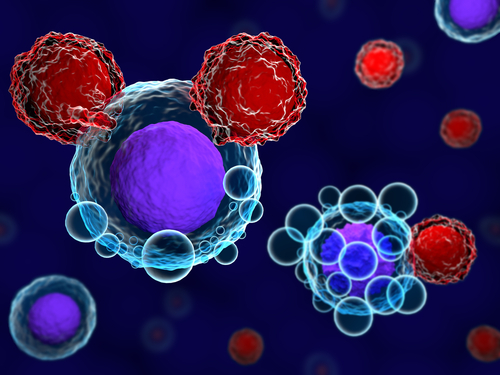Daily treatment with a low dose of eRapa, Emtora Biosciences‘ new formulation of the therapeutic agent rapamycin, was safe and well tolerated, and led to immune system cell boosting in patients with low-grade prostate cancer, according to data from a Phase 1b clinical trial.
The findings were presented in a poster at the 2020 Clinical Immuno-Oncology Symposium of the American Society of Clinical Oncology and Society for Immunotherapy of Cancer in Orlando, Florida. The study was titled, “Results of a phase Ib trial of encapsulated rapamycin in prostate cancer patients under active surveillance to prevent progression.”
Activation of mTOR — a protein kinase involved in cell proliferation and survival — has long been known to influence prostate cancer growth and metastasis, making it a promising target for cancer therapy.
Rapamycin, a naturally occurring chemical that inhibits mTOR, and its analogs have been successfully applied to treat specific cancers in the clinic. But despite its potential, rapamycin has shown low bioavailability (the fraction of a therapy that actually reaches circulation) and toxicity, and pharmacokinetics (the way the body processes a therapy) varies among patients.
eRapa, a proprietary formulation, was developed to improve rapamycin’s properties. It consists of very small rapamycin particles enclosed in a polymer capsule that protects the therapy’s active ingredient from degradation in the stomach’s acidic environment.
According to the company, eRapa provides nearly 30% more therapy than generic rapamycin, as well as less interpatient variation in terms of absorption, distribution, metabolism, and excretion.
The Phase 1b clinical trial (NCT03618355) evaluated the safety and effectiveness of eRapa in patients with low-grade prostate cancer managed with active surveillance, an approach that involves actively monitoring the condition for signs of progression.
To determine optimal dosing, a total of 14 patients were divided into three dosing schedules: 0.5 mg weekly (three patients), 1 mg weekly (three patients), and 0.5 mg daily (eight patients). Two patients in the last group stopped treatment due to non-dose limiting toxicity (grade 1-2) adverse events.
Patients were treated for three months and followed for six months. They achieved low and stable blood levels of rapamycin and showed positive changes in their immune systems, such as increased numbers of memory CD8 T-cells and natural killer (NK) cells — types of immune cells that participate in anti-tumor responses.
The 0.5 mg daily dose proved better than the other two doses at producing anti-tumor immune responses.
Throughout the study, patients did not experience significant changes in prostate specific antigen (PSA) levels — a marker of prostate cancer — and no patient progressed while on therapy.
Among patients receiving the 0.5 mg daily dose, there were no significant differences in quality of life from baseline to three months, but researchers said there was a “suggestion of withdrawal effects at six months.”
The low-dose eRapa treatment was found to be safe and well tolerated, with only one severe dose-limiting toxicity (neutropenia, low levels of neutrophils, an immune cell) reported in the daily-dosing group.
“Further investigation with low-dose and/or intermittent dosing of eRapa as a preventive agent in [prostate cancer] and other indications will be required to establish clinical benefit,” the researchers wrote.
“The trial results are an important validation of eRapa’s potential to positively impact the immune system at low and/or intermittent doses and provide valuable safety, tolerability, and dosing information for the company’s upcoming Phase 2a efficacy study,” George Peoples, MD, Chief Medical Officer of Emtora Biosciences, said in a press release.
Last year, the company was awarded a grant from the Cancer Prevention and Research Institute of Texas for advancement of the investigational therapy. A Phase 2a trial testing eRapa in the treatment of the rare disease familial adenomatous polyposis (FAP) is scheduled to start in April.

